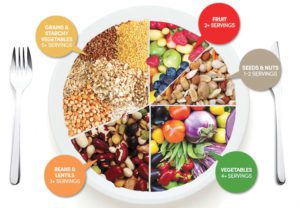By John Canterbury, M.D.


What is a plant-based diet?
There are two major food sources in our diet: plants and animals. A plant-based diet includes more volume of food from plants than animal sources. This type of diet includes grains (especially whole grains), beans, lentils, fruits, and vegetables—but it is not necessarily strictly vegetarian. In fact, a plant-
based diet can include a whole range of eating styles, from a vegan approach (excluding all animal products, including dairy) to a diet that is largely based on plants but does include some animal protein.
Are there health benefits to eating a plant-based diet?
There is sound medical evidence that a plant-based diet contributes to longevity and good health. A balanced, varied plant-based diet is protective:
• It’s high in fiber.
• It provides adequate protein for growth and repair.
• It’s high in antioxidants that are critical to neutralizing free radicals that cause aging and chronic disease, including cancer.
• It’s high in vitamins and minerals.
• It’s low in saturated fat that promotes heart disease.
Also, plants have much lower caloric concentration than animal protein overall, which allows for more food volume without excessive weight gain.
The China Study, a 20-year comprehensive study of nutrition conducted by Cornell and Oxford Universities and the Chinese Academy of Preventive Medicine, describes how the typical standard American diet, which has become very high in animal protein and unhealthy fats and low in fiber, promotes substantially more chronic disease and obesity than a more plant-based, whole-foods diet. The study further illustrates the fact that much of the world lives on a plant-based diet, consuming only small amounts of animal protein due to cost and availability, with much less chronic disease and obesity than the United States.
Long-term research shows that a totally plant-based vegetarian diet along with exercise and stress management can actually reverse heart disease. A plant-based diet protects the body from cancer-causing agents and decreases the inflammation that is responsible for heart disease, stroke, and diabetes. Simply stated, a diet high in animal protein increases inflammation that can contribute to chronic diseases, whereas a plant-based diet actually lowers inflammation.
How far should you go?
So, do you need to fully embrace veganism or vegetarianism to reap the benefits of a plant-based diet? The answer, for many of us, is no—but we can all benefit from transforming our daily diet to one that is primarily plant-based.
As a first step in this direction, take some time to look closely at your plate when you sit down for your next meal. At least half of your plate should be filled with vegetables and/or fruit, and a quarter of your plate should be filled with whole grains. The remaining quarter should be filled with either a lean animal protein, such as fish or chicken, or a plant-based protein such as beans or lentils.
When considering serving sizes of animal protein at dinnertime, aim for 3- to 4-ounce servings for women and children and 5- to 6-ounce servings for men. Better yet, try to include five to seven meals per week with no animal protein, substituting plant-based proteins instead.
A few great plant-based protein meal choices include beans and rice topped with salsa; a bean burrito made with a whole-grain, low-fat tortilla; whole-grain bread topped with natural peanut butter; and high-protein pasta tossed with fresh tomatoes, garlic, and basil. At every meal and snack, think of ways to include plant sources of food.
For those who wish to become vegan or vegetarian, ease into increasing plant-based protein in your diet and decreasing animal protein. Be aware that eliminating animal protein while continuing to consume processed food or “junk food” will not improve overall health. Try to focus on eating whole foods, not processed food, to ensure that you see optimal benefits from a plant-based diet. For those who eliminate animal products entirely, it is important to supplement with vitamin B-12, the only nutrient not available in a plant-based diet.
Eating a primarily or completely plant-based diet may be one of the best and most practical ways to improve your health and well-being. While we can all benefit from making even small changes and moving in this direction, some health conditions may require a more aggressive dietary approach. So the next time you are tempted to reach for another helping of chicken or beef, try more salad, green beans, and fruit instead, and change your plate for a healthier you.
John Canterbury MD
South Florida Internal Medicine
680 Second Avenue North, Suite 203
Naples, FL 34102
239-330-1382
 Southwest Florida's Health and Wellness Magazine Health and Wellness Articles
Southwest Florida's Health and Wellness Magazine Health and Wellness Articles
